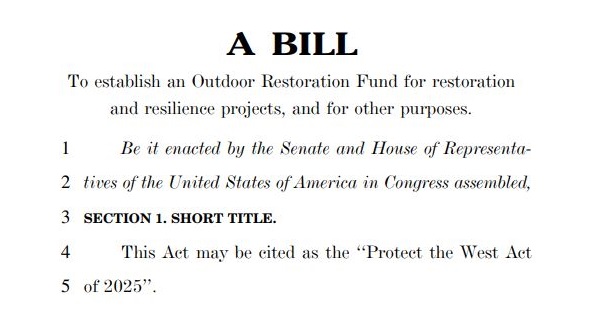$60B Protect the West Act would reduce wildfire risk
6 min read
|
Getting your Trinity Audio player ready...
|
from the Office of Sen. Ron Wyden
U.S. Sen. Ron Wyden joined Senate and House colleagues to reintroduce legislation Feb. 21 that would make a $60 billion investment in forests in Oregon and across the West to lessen wildfire risk, restore watersheds, protect communities, and reduce wildfire suppression costs.
“With summers getting drier and hotter, the treasured lands in Oregon and the West are a tinderbox waiting to light ablaze,” said Wyden. “In my town halls, I’ve heard countless Oregonians fearing for their health and safety while struggling to maintain their economic livelihood as severe drought and wildfires wreak more havoc on their communities every year. More investments are needed to protect our forests and watersheds so local communities across the West are healthy and can have the opportunity to explore its beautiful natural treasures for generations.”
Joining Wyden in reintroducing the legislation were Sen. Michael Bennet (D-Colo.), Sen. John Hickenlooper (D-Colo.), Sen. Ruben Gallego (D-Ariz.), Sen. Jacky Rosen (D-Nev.), and Rep. Jason Crow (D-Colo.).
“In the West, our forests, grasslands, and watersheds are essential to our economy and way of life,” said Bennet. “But they are under threat from the worsening effects of climate change and consistent underinvestment from the federal government. As we face a 1,200-year megadrought and wildfire season that never seems to end, we need to break from the status quo and invest in the restoration of our forests and public lands to meet this challenge. We have no time to waste.”
“Colorado’s forests, grasslands, and waterways are the bedrock of our outdoor economy,” said Hickenlooper. “Every effort we make to prevent wildfires and mitigate the impact of climate change is an investment in Colorado’s future.”
“Climate change is threatening our way of life in Colorado. We must act,” said Crow. “The Protect the West Act would help combat intensifying wildfires and help better protect Colorado communities.”
America’s forests and public lands are essential infrastructure – supporting a $1.2 trillion outdoor recreation economy and $222 billion agricultural economy.
Despite the importance of our forests to our economy, watersheds, and way of life, Washington D.C. has failed to adequately invest in them. The federal government spends $2.9 billion to put out wildfires every year, with costs expected to rise to $3.9 billion by 2050.
Preventing wildfires before they start saves taxpayers money by reducing response and recovery costs. The National Oceanic and Atmospheric Administration estimates that, over the last five years, the U.S. spent nearly $48 billion on wildfires.
Barely three months into 2025, annual wildfire costs are already estimated to exceed $250 billion in damages due to the Los Angeles wildfires.
The Protect the West Act would:
- Establish an Outdoor Restoration & Watershed Fund to increase support for local efforts to restore forests and watersheds, reduce wildfire risk, clean up public lands, enhance wildlife habitat, remove invasive species, and expand outdoor access;
- Establish an advisory council of local, industry, conservation, tribal, and national experts to advise funding priorities, coordinate with existing regional efforts, and provide oversight;
- Empower local leaders by making $20 billion directly available to state and local governments, tribes, special districts, and nonprofits to support restoration, drought resilience, and fire mitigation projects. These funds would empower local leaders to bring diverse voices to the table to develop solutions;
- Partner with states and tribes to invest $40 billion to tackle the backlog of restoration, fire mitigation, and resilience projects across public, private, and tribal lands;
- Create or sustain more than two million good-paying jobs, primarily in rural areas, to support existing industries like forest product, agriculture, and outdoor recreation; and
- Save landowners and local governments money by investing in wildfire prevention and natural hazard mitigation on the front end, which is 30 times more cost-effective than recovering forests and watersheds after natural disasters have struck.
The bill is supported by The National Wildlife Federation, the Southern Ute Indian Tribe, National Association of State Foresters, The Freshwater Trust, American Forests, National Wild Turkey Federation, National Audubon Society, Family Farm Alliance, Theodore Roosevelt Conservation Partnership, Western Landowners Alliance, Western Resource Advocates, Trout Unlimited, and Conservation Legacy.
“The Protect the West Act is a significant investment in Colorado’s natural resources and Colorado is proud to support its reintroduction in the U.S. Senate,” said Dan Gibbs, executive director, Colorado State Department of Natural Resources. “As Colorado experiences drought and continued threats from devastating wildfires, now is the time to invest in Colorado’s forests, watersheds, and landscapes that drive economic activity across the west, employ thousands of Americans, and provide environmental and ecological benefits to our communities and wildlife.”
“One of the greatest threats to our Tribal lands are the devastating wildfires caused by the extreme drought conditions in the western United States,” said the Southern Ute Indian Tribe. “Sen. Bennet’s Protect the West Act will provide much needed investment in conservation, restoration and wildfire mitigation. A key component of this legislation is Sen. Bennet’s recognition of the importance that Tribes have in land use and regulation, assuring that funds will be made available directly to Tribes for maintenance of our forests, watersheds and rangeland. Moreover, he assures that Tribes will have a seat at the table in determining the distribution of funds, ensuring that there will be a tribal representative working alongside our state and federal partners on the Restoration Fund Advisory Council. We thank Sen. Bennet for introduction of this important legislation and look forward to its swift passage in Congress.”
“Healthy watersheds face numerous challenges, including increasing drought, longer and hotter fire seasons, disconnected watersheds and degraded streams that no longer support healthy fisheries. The most effective way to tackle this challenge is through partnerships and collaborative conservation at the landscape scale,” said Chris Wood, president and CEO, Trout Unlimited. “The Protect the West Act would foster collaboration and provide resources for public-private partnerships to restore lands and waters across multiple jurisdictions, creating jobs and better fishing along the way. We thank Senator Bennet for his leadership and vision to restore our lands and waters at the scope and scale that will make a difference for future generations.”
“The Colorado River District’s highest priority is to protect the water security of Western Colorado. Water security starts with our forests,” said Andy Mueller, general manager, Colorado River District. “Our largest source of water is the snowpack that develops in our forests above 9,000 feet in elevation, mostly on federal lands. Sen. Michael Bennet’s $60 billion Protect the West Act proposal is a direct water security initiative through the funding of proactive watershed protection actions. These actions would help prevent catastrophic fires and start restoration work where warming temperatures and fires have already done harm. It’s noteworthy that $20 billion will be available to fund projects generated at the state and local levels. We applaud Senator Bennet for advocating for important western priorities in the Senate.”
“I support the Senator’s Protect the West Act. This is a great first step in recognizing and acknowledging the problem that was created over 30 years ago,” said Merrit Linke, Grand County commissioner. “The lack of proactive management and the ‘hands-off’ approach is now clearly having devastating effects on our communities, forest health and sustainable watersheds. This bill addresses this problem, provides much needed funding, and hopefully is the beginning of a new era in resource management. Now it is time to get to work.”
“As Western communities continue to face the threats and the impacts of the climate crisis, now is the time to pursue initiatives that will help us become more resilient,” said Jon Goldin-Dubois, president of Western Resource Advocates. “The Protect the West Act will provide critical resources to help Western states mitigate wildfire, restore forests, improve air and water quality, and advance equity, all while pumping billions of dollars into local economies and supporting millions of good-paying jobs; it’s a true win-win. We applaud Senator Bennet for his leadership and look forward to supporting this legislation to build a more resilient West.”
“Healthy forests support fish and wildlife habitat and outdoor access important to hunters, anglers, and recreationists in Colorado and across the nation,” said Joel Pedersen, CEO, Theodore Roosevelt Conservation Partnership. “However, decades of inadequate funding for forest management have placed a strain on the National Forest System that will require active management and sustained funding to increase workforce capacity. Further, these investments will help to ensure we’re better prepared to address the growing risks associated with wildfire. The TRCP applauds the proactive investments in our forests and watersheds and the additional resources for growing the forest management workforce provided through the Protect the West Act.”







